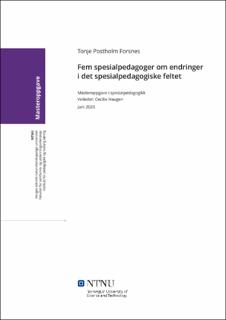| dc.contributor.advisor | Haugen, Cecilie | |
| dc.contributor.author | Forsnes, Tonje Postholm | |
| dc.date.accessioned | 2021-09-28T17:37:01Z | |
| dc.date.available | 2021-09-28T17:37:01Z | |
| dc.date.issued | 2020 | |
| dc.identifier | no.ntnu:inspera:53268456:15382039 | |
| dc.identifier.uri | https://hdl.handle.net/11250/2784644 | |
| dc.description.abstract | Når jeg kommer ut i læreryrke vil det være oppstarten med en ny læreplanreform i norsk skole, fra høsten 2020. Da vil Fagfornyelsen ha tredd i kraft, og vi vil se konturene av hvilke utslag denne kommer til å gjøre i skolen og for spesialpedagogikken.
Formålet med dette forskningsprosjektet er å besvare problemstillingen: Hvilke endringer er fremtredende i fem spesialpedagoger sin praksis? Og hvordan kan disse endringene på mikronivå sees i lys av hva som har skjedd på makronivå i læreplanverket de siste 23 årene med hovedfokus på K06? For å besvare denne problemstillingen tok jeg i bruk 3 forskningsspørsmål.
Mitt empiriske datamateriale ble samlet inn ved hjelp av fem kvalitative forskningsintervju med spesialpedagoger som utøver sitt yrke i Trøndelag. Jeg tok i bruk en abduktiv tilnærming i analysen, hvor jeg først hadde bestemt meg for å benytte meg av Basil Bernstein sine pedagogiske identiteter som analyseverktøy, men etter hvert også tok i bruk hans begreper innenfor kommunikasjonskontroll; klassifikasjon og innramming. Analysen er tredelt, ved hjelp av forskningsspørsmålene hvor jeg først tar for meg hvilke endringer som er aktuelle ved kunnskap, deretter hvilke endringer som er aktuelle ved pedagogikk og til slutt hvilke endringer som er aktuelle ved de pedagogiske identitetene.
Funnene i analysen viser at det finnes spor av alle de fire identitetene, og at det har skjedd noen endringer både ifølge spesialpedagogene på mikronivå, men også når man sammenligner med endringer som har skjedd på makronivå med hovedfokus på K06. Det er den terapeutiske pedagogiske identiteten som er dominant på mikronivå i mitt datamateriale, samtidig som både den prospektive og retrospektive pedagogiske identiteten er tydelig fremtredende. Jeg finner også noen spor av den markedspedagogiske identiteten.
Analysefunnene blir drøftet i lys av den nyliberalistiske dreiningen i norsk utdanningspolitikk, samtidig som de blir satt i forbindelse med den spesialpedagogiske debatten med Nordahl i sentrum. Det blir også drøftet hvilken innvirkning K06 egentlig har hatt på det spesialpedagogiske feltet i praksis.
Sentrale nøkkelbegreper i studien:
Pedagogiske identiteter, Klassifisering, Innramming, Læreplanreformer, K06, Basil Bernstein. | |
| dc.description.abstract | When I come into teaching profession, it will be the start of a new curriculum reform in Norwegian school, from the fall of 2020. Then, the subject renewal will have come into force, and we will see the contours of what impact this will make in school and for special education.
The purpose of this research project is to answer the question: What changes are prominent in five special educators' practices? And how can these changes at the micro level be seen in light of what has happened at the macro level in the curriculum over the last 23 years with the main focus on K06? To answer this question, I started using 3 research questions.
My empirical data was collected using five qualitative research interviews with special educators who practice their profession in Trøndelag. I applied an abductive approach in the analysis, where I first decided to use Basil Bernstein's pedagogic identities as an analysis tool, but eventually also applied his concepts of classification and framing.
The analysis is divided into three parts, using the research questions where I first consider which changes are relevant to pedagogical knowledge, then which changes are relevant to pedagogy and finally which changes are relevant to pedagogical identities. The findings of the analysis show that there are traces of all the four identities, and that there have been some changes, both according to special educators at the micro level, but also when compared with changes that have taken place at the macro level with the main focus on K06. It is the therapeutic pedagogic identity that is dominant at the micro level in my empiricism, while both the prospective- and retrospective pedagogic identity are clearly prominent. I also find some traces of the de-centred market pedagogic identity.
The findings are discussed in light of the neo-liberalist twist in Norwegian education policy, while at the same time being linked to the special educational debate with Nordahl at the center. It is also discussed what impact K06 has had on the special education field in practice.
Keywords in the Study: Pedagogic Identities, Classification, Framing, Curriculum Reforms, K06, Basil Bernstein. | |
| dc.language | nob | |
| dc.publisher | NTNU | |
| dc.title | Fem spesialpedagoger om endringer i det spesialpedagogiske feltet | |
| dc.type | Master thesis | |
